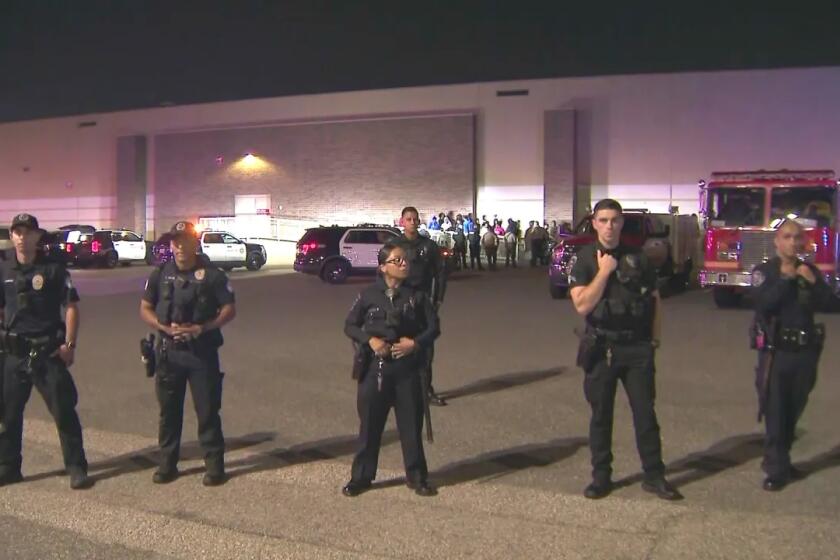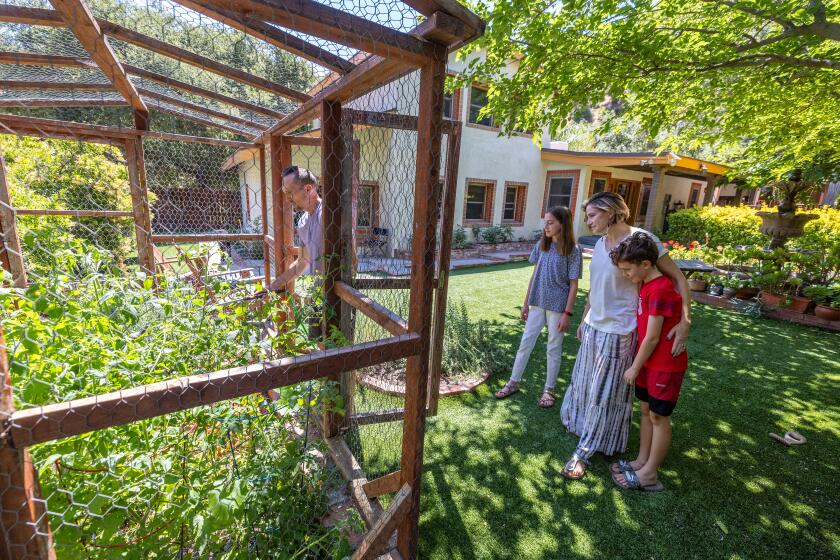Religious groups feel the financial pinch
When a foot-long chunk of water-damaged plaster fell from the domed sanctuary ceiling at Wilshire Boulevard Temple last year, shattering in front of the pulpit below, the room was quickly cordoned off.
Had the incident last October occurred during Saturday Shabbat services instead of three days earlier, the story might have been different.
“Fortunately, it happened when the sanctuary was empty,” Rabbi Steven Leder said.
The historic synagogue already had launched a major building program that included the restoration of the 1929 edifice with its distinctive sanctuary and Moorish dome. To date, $71 million has been raised. But in the last eight months, the campaign has slowed significantly, Leder said.
The plaster incident could be a metaphor for what is befalling synagogues, churches and other religious institutions nationwide in the midst of the worst economic downturn since the 1930s. If the roof isn’t falling in, it may, at least, be cracking.
With donations slowing, religious groups across the theological spectrum are reporting millions of dollars in reduced income that is resulting in staff layoffs and program cuts.
Jewish and Christian seminaries also are feeling the pinch. Eight seminaries for the nation’s largest Lutheran denomination, the Evangelical Lutheran Church in America, are undergoing staff reductions and budget cuts.
In Los Angeles, consideration was given this spring to closing the Los Angeles campus of Hebrew Union College-Jewish Institute of Religion, a seminary serving the Jewish Reform movement. Ultimately, college officials opted to keep the campus open, but only after cutting staff and entering into cooperative arrangements with other institutions and seminaries.
But college officials confirmed there is ongoing discussion of how millions more could be saved, including preliminary talks about selling the campus to the adjacent USC and leasing it back.
Meanwhile, 69 long-term foreign missionaries and 350 short-term missionaries for the Southern Baptist Convention will remain home this year because of reduced giving by local congregations to the denomination’s cooperative program. Southern Baptist officials also report a $29-million drop in an annual Christmas offering on which half the program’s budget depends.
These and other examples of retrenchment by religious organizations from coast to coast have, inevitably, prompted some soul searching. How to reconcile the reality of reduced income with the moral imperative to serve others?
Nationally, giving to all charitable causes dropped 2% from 2007 to 2008, to about $307 billion after adjusting for inflation, according to the Giving USA Foundation, a nonprofit organization that tracks such contributions. The 2008 figure was the first decline since 1987, and only the second since 1956, when Giving USA began its record-keeping. So far, 2009 looks no better.
Although donations to religious organizations, as opposed to all charitable giving, increased 1.65% in inflation-adjusted dollars in 2008 compared to 2007, those figures do not reflect more recent evidence.
“The first quarter of this year was probably the toughest quarter that a lot of organizations faced. The real impact of 2008 really didn’t catch up with budgets until the first part of this year,” said Kristina Carlson, a member of Giving USA’s board. The group’s reports are prepared by Indiana University’s Center on Philanthropy.
There are exceptions to the trend. The Islamic Center of Southern California reports that offerings are slightly better this year than last, although the growth rate has slowed. At Wilshire Boulevard Temple, Leder said an already slim staff and conservative budgets and investing had allowed the synagogue to ride out the economic storm.
But for others, the situation is not expected to get better soon despite signs that the recession may be ending. That is because this year’s budgets are based on reduced giving in 2008.
In some cases, budget decisions made this year will not be reversed. The socially conservative ministry Focus on the Family, which reported a $6-million shortfall in meeting this year’s $138-million budget, says it will turn over its controversial Love Won Out conferences, which encourage gay men and lesbians to overcome “unwanted same-sex attractions” through faith, to another group, Exodus International. It said budget considerations were a factor.
At Wilshire Boulevard Temple, Leder said there has been an increase in requests this year for scholarships to allow children to attend Jewish camps and the congregation’s elementary school. Of the temple’s 2,500 member families, 900 pay reduced dues.
“We are fully aware many families within the congregation are very stressed by the current economic turmoil, and we’ve done everything we can to help them remain a part of the community,” Leder said. “No needy family has been turned down.”
The congregation also continues to offer a range of social services to the wider community, he said.
The national Episcopal Church, which recently reduced its 2010-12 budget by $23 million, said that despite the pinch, it too would continue its social mission. Its leadership decided to cut 30 staff positions at its New York headquarters, but restored funding for programs in the developing world. The church said in a statement that the budget was focused on “giving to others first and then to ourselves last.”
Religious leaders said they see another phenomenon at work that may distinguish religious giving from other charitable giving. Those who contribute for religious purposes tend to cut spending elsewhere before holding back on what they put in the offering plate.
Congregants at Wilshire Boulevard Temple, for example, are keeping their commitments to the building program, Leder said.
Two factors may be at work, Leder and others said. First, religious givers are thought to act out of core beliefs, such as loving God and their neighbors. It is a question of practicing what is preached.
Second, many congregants have confidence that faith-based social services are reliable and efficient at helping those in need.
“People in various faith communities feel the pain everyone else feels,” said Jihad Turk, director of religious affairs at the Islamic Center of Southern California. “But they are still willing to sacrifice for the greater good. They are willing to give a little more.”
--
larry_stammer@yahoo.com
More to Read
Start your day right
Sign up for Essential California for news, features and recommendations from the L.A. Times and beyond in your inbox six days a week.
You may occasionally receive promotional content from the Los Angeles Times.






